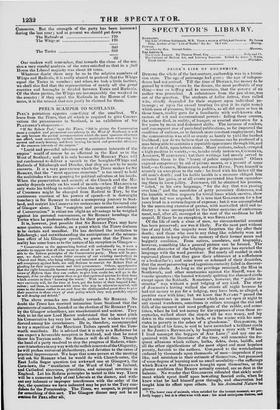PEEL'S SCAMPER TO SCOTLAND.
PEEL'S patriotism appears something of the smallest. We learn from the Times, that all which is required to give Conser- vatism the preeminence in Scotland, is an exhibition of Sir PLAUSIBLE'S eloquence- " If Sir Robert Peel," says the Times, "fail in giving the Conservative cause a complete and permanent ascendancy in the West of Scotland, it will be onk because the partial accommodation which the most spacious structure can afford, mast necessarily exclude immense multitudes from witnessing his earnest and manly bearing, and from hearing his lucid and powerful advocacy of the common interests of the empire."
"Lucid and powerful advocacy of the common interests of the empire" would of course be as effectual in the East as in the West of Scotland ; and it is only because Sir ROBERT PEEL will
not condescend to deliver a speech to the benightedWhigs and Radicals of' Edinburgh and Dundee, that they are not to be made converts. It is a very poor excuse which the Times makes for Sir ROBERT, that the "most spacious structure" is too small to hold the multitudes e ho are gasping thr political salvation at his hands. When the preservation and security of the Church and the Mo- narchy depends solely on his word of mouth—when MELBOURNE only waits his bidding to retire—when the majority of the House of Commons might e'be changed from Radical to Tory, by the
continuous exertion of his powers of speech—it is downright treachery in Sir ROBERT to make a scampering journey to Scot- land, and restrict his Conservative endeavours to the favoured city of Glasgow alone. The "complete and permanent ascendancy of Conservatism" is either too slight an advantage to be weighed against his personal convenience, or Sir ROBERT humbugs the Tories when he professes affection for their principles.
It is, however, just possible that Sir ROBERT PEEL may have some qualms, some doubts, on a point which the Times declares to be certain and manifest. Ile has declined the invitation to Edinburgh; and notwithstanding the anticipations of the miracu- lous effect of his Glasgow speech, we guess that the Times in reality has some fears as to the nature of his reception in Glasgow- " Conservative as the approaching festival will undoubtedly he, it were a mistake to suppose that all who mean to attend it are Telles, or even favour- able to the Reform principles of the Conservative party. There will be pre- sent, we doubt not, certain bitter enemies of our existing institutions in Church and State, who being willing and interested accessories to the O'Con- nell conspiracy against both, are only desirous to convict Sir Robert Peel of pleading for their improvement and their permanence. Others, apprehensive that the right honourable baronet may possibly propound sounder and sincerer views of Reform than they can endure to give him credit for, will go to the banquet, if for no other purpose than to get that equivocal quietus for their fears which consists in their ' knowing the worst.' With not a few, the feeling of mere curiosity will, fur the time at least, get the better of their languid Libe- ralism; and these, in common with some who may be otherwise neutral, will come to the dinner rather to see and hear the distinguished guest than to give their sanction to those views of state policy which they may probably expect he will develop and defend."
The above remarks are friendly towards Sir ROBERT. No doubt the Times has received intimation from Scotland that the statements of reaction, founded on the election of Sir ROBERT PEEL by the Glasgow schoolboys, are unsubstantial and untrue. They wish to let the new Lord Rector understand that he must pitch his Conservative key very low indeed, unless he wishes to create discord among his entertainers. He is, therefore, recommended to try a repetition of the Merchant Tailors speech and the Tam- worth manifesto. He is advised that it is only as a Reformer he can expect a favourable reception in Scotland, and that he must throw his Toryism aside. Sir ROBERT will do all this. Though the head of a party resolved to stop the progress of Reform, when- ever it interferes in any way with the selfish interests of the Oligarchy, he will profess universal philanthropy, and devotion to the cause of practical improvement. We hope that some person at the meeting will ask Sir ROBERT what he would do with Church-rates, the East India Sugar question (an awkward one at Glasgow), the Corn-laws, the "mutilation of the Word of God" in Ireland, and Cathedral sinecures, pluralities, and episcopal revenues in Enelaed. Let his Reform principles be tested in this way. There will be a numerous body of real Liberals at the dinner, and with- out any indecent or improper interference with the order of the day, the questions we have indicated may be put to the Tory can- didate for the Premiership. The Times, we suspect, is prepared for something of this sort. The Glasgow dinner may not be an ovation for PREL after all..


























 Previous page
Previous page